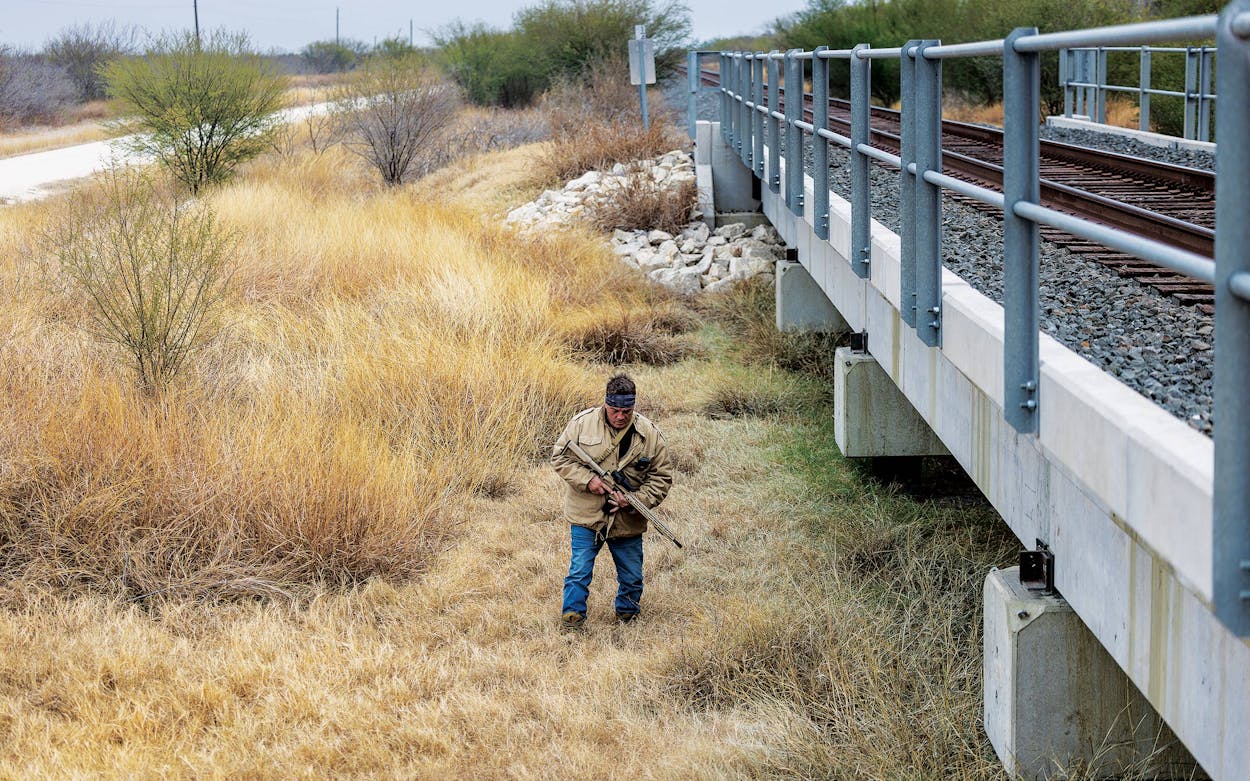All day, members of the Patriots for America waited patiently for Samuel Hall’s instructions. The group had gathered at a rented house in Kinney County, which is on the border with Mexico and about 150 miles west of San Antonio. Finally, around 7 p.m., Hall, a former Protestant missionary who is the militia’s leader, emerged from his bedroom to deliver a prayer and a brief speech. The operation that January night, Hall warned his followers, might be dangerous.
At his command, the militia members and a few associates, who sometimes travel with the group, began to prepare. Kristina Binegar, a general contractor from Allen, a half hour north of Dallas, flaunted her favorite machete from her collection of blades. Nick Williams, an IT worker from Dallas, carefully set down a $4,000 assault rifle to sip an energy drink. Six others, who ranged in age from eighteen to sixty-plus, donned ballistic vests and holstered sidearms. Most in the group have full-time jobs and take days off to patrol the border. They piled into three trucks and headed for Eagle Pass, about an hour south, in Maverick County.
In Shelby Park, which overlooks the Rio Grande, Hall and his team met with Abraham Rubio, a Maverick County sheriff’s deputy. A National Guardsman asked those in the armed group to identify themselves, then described them to a colleague as “the sheriff’s team.” (The Maverick County Sheriff’s Department denies any official association with the PFA.) Rubio and the Guard, sent to the border as part of Operation Lone Star, Governor Greg Abbott’s immigration crackdown, then briefed the PFA members, many of whom have no training in law enforcement, on where migrants might be hiding. They pointed the group to a path littered with discarded bags, clothes, shoes, and toilet paper. The militia members walked down the trail to the river and began to sweep the area.
They soon found one migrant, a Nicaraguan man with an injured leg, resting in a field. The group escorted the man to a National Guard truck to await federal border agents to take him to a detention facility.
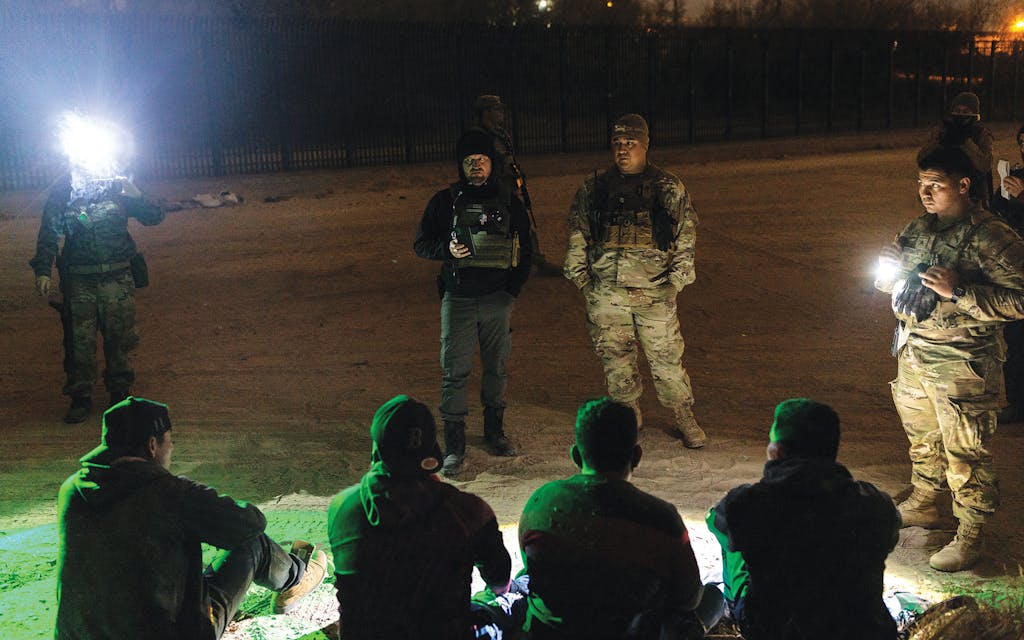
Shortly after midnight, a commotion a hundred yards north drew the group’s attention. Hall jogged toward flashlights in the distance, where Rubio and a colleague were chasing several figures out of the brush. By the time Hall arrived, four young men from Chiapas, in southern Mexico, sat on the ground. They looked scared and tired. Hall’s team recorded the scene with smartphones and GoPro cameras. Terry Anderson, an administrator of a Facebook page that posts right-wing and Christian memes, was traveling with the group that night and asked the men in Spanish why they hadn’t gone to a U.S. consulate in Mexico to get legal permission to cross. They ignored his question. The deputies and National Guard stood by silently.
Hall offered the Mexican migrants water and granola bars. Then he and Anderson took pictures and video of the detained migrants, occasionally turning the camera on themselves as they narrated the scene. Hall spotted a child’s shoe nearby and quipped, “You can start a business picking up these clothes and shoes and call it Biden’s Outerwear.”
Moments later, four Cubans seeking asylum crossed the cold river and climbed a boat ramp at the park’s edge. A Guardsman ordered the group to sit on a nearby curb. Kevin Caldwell, who was happily retired from a job in the financial industry when he met Hall, separated the Cubans from their bags after another PFA member asked them in Spanish if the group could do so. “They may have weapons,” Caldwell explained. Hall said that as a routine safety measure, the militia asks migrants if they can take their possessions without searching them—and that none have ever refused. But this time a National Guardsman noticed and returned the belongings to the border crossers, explaining that the Guard does not take migrants’ property.
Hall later told me that the National Guard is not as effective as his group at deterring immigration. He believes his methods—highly visible armed daytime reconnaissance and stealthy nighttime tracking—can scare migrants out of even crossing the Rio Grande. Nonetheless, for those who do cross, Hall claims, his group is saving them from exploitation by smugglers who meet them on the U.S. side to take them farther north. He considers the PFA’s work a religious duty. “We are there,” he said, “to be the hands and feet of Christ.”


A native of Dallas, Hall, now forty, studied practical theology at Christ for the Nations Institute, a local Bible college, in the early 2000s. He spent part of his twenties as an evangelical missionary in Jamaica, Kenya, and Uganda. A few years later, he returned to Texas and took a job in the financial industry, but he lost that position during the Great Recession and began selling cars at a Honda dealership.
In 2015, watching Trump rallies, Hall got the idea to start a militia to protect conservative protesters. Shortly thereafter, he became obsessed with what he believes is an epidemic of child sex trafficking driven by a cabal of elitist pedophiles. He listened to audio of a possible sexual assault on a minor that had been posted on a PFA social media page. “I was praying in tongues,” Hall recently told prospective PFA donors, recounting the experience. “After about thirty minutes, a light bulb clicked over my head, and I believe it was the Holy Spirit.”
Hall and militia members began to track those whom he suspected were sex offenders. Though law enforcement officials followed up on some of Hall’s tips, they could not corroborate his accusations and did not pursue legal action.
Many current members of the PFA met Hall at rallies in 2020 and were attracted by his zeal for rooting out what they see as dangers to U.S. democracy. As the pandemic raged, as Trump sought reelection, and as protests over the murder of George Floyd dominated the news, Hall traveled the state protesting COVID-19 restrictions, the Black Lives Matter movement, and, in one instance, the removal of a Confederate statue from a public space. In October of 2020, Hall spoke at a rally in Austin, vowing that anywhere protesters from BLM or self-described anti-fascist groups showed up, his militia would be there too, to “defend our families and communities from the violence of people being pulled out of their cars, from businesses being burned down.”
Hall keeps the official roll call of the PFA a secret, but its ranks appear small. (In addition to those on the January patrol in Kinney County and Eagle Pass, I met two other members at events in Dallas and Austin.) He puts prospects through a vetting process that includes “cloud therapy”—his term for skydiving—reasoning that anyone who can handle the terror of dropping out of a plane can handle the stress of patrolling the border.
The PFA provides housing and food for its border missions. Members provide their own weapons and equipment. Hall frequently posts videos of his border expeditions on social media and is a passionate fund-raiser. At an event this year in Dallas, the group raised about $10,000; Hall spoke, along with four Republican U.S. House candidates (all of whom lost their primaries). On the Christian crowdfunding site GiveSendGo, the PFA has raised close to $16,000.
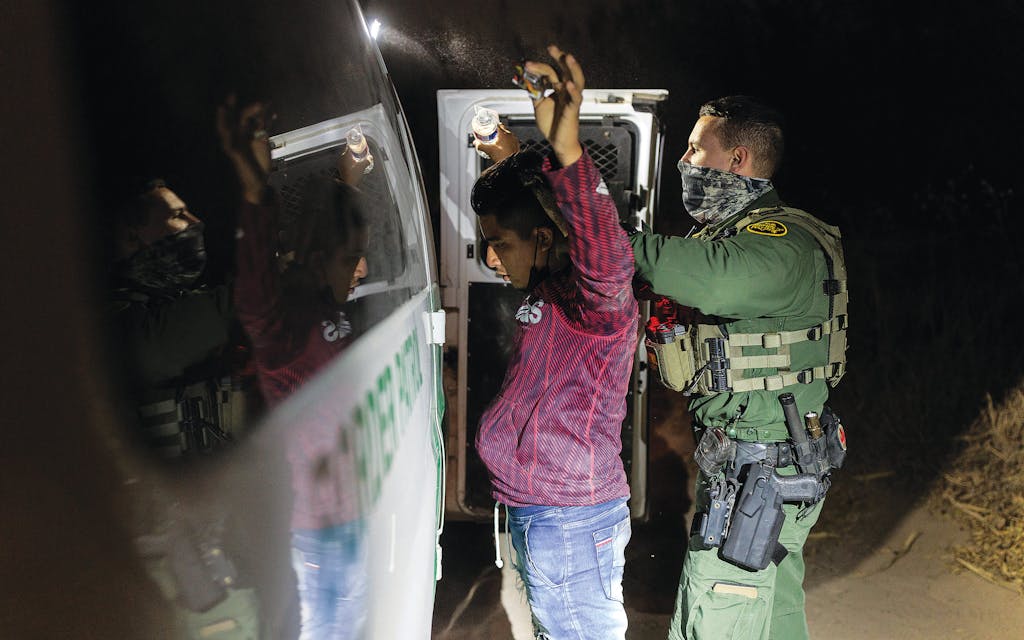
Throughout 2021 the PFA marched at BLM rallies as counterprotesters and provided armed “community defense” at right-wing demonstrations and campaign events for gubernatorial candidate Allen West. But the militia found its newest mission at the border.
That April, a month after Abbott announced Operation Lone Star, officials in Kinney County, where migrants had trespassed on numerous private ranches, had come to believe that the county wasn’t receiving enough help from either Border Patrol or the governor. County Judge Tully Shahan, a Republican, declared a “local state of disaster” and, along with Republican county attorney Brent Smith, broadcast the county’s need for money and enforcement support. “This invasion has resulted in our residents being assaulted, injured, threatened, robbed, and intimidated by illegal aliens from around the world,” Shahan and Smith wrote in a letter accompanying the declaration. (The Kinney County sheriff’s public information representative, Matt Benacci, said that the number of non-trespassing crimes in the county did not significantly increase last year.) By June, Abbott ordered state troopers to arrest migrants in border counties on state trespassing charges and in the fall sent Kinney County $3 million for enforcement and prosecution activities.
At an October meeting of the Kinney County Commissioners’ Court, Hall delivered a fiery speech answering Shahan and Smith’s call and declared that his militia had arrived to help. Shahan responded, “We appreciate you coming and we appreciate you being here and we’ll take your help, but we want to do it the right way.”
Now the militia is devoting much of its resources to keeping undocumented immigrants out of Texas. Hall, like many GOP officials, believes Democrats are plotting to create an open border and encouraging mass migration to gain a new voting bloc. “You turn Texas blue by allowing illegals to come into the country,” he told me. “Then we will never again see the America we grew up in.”
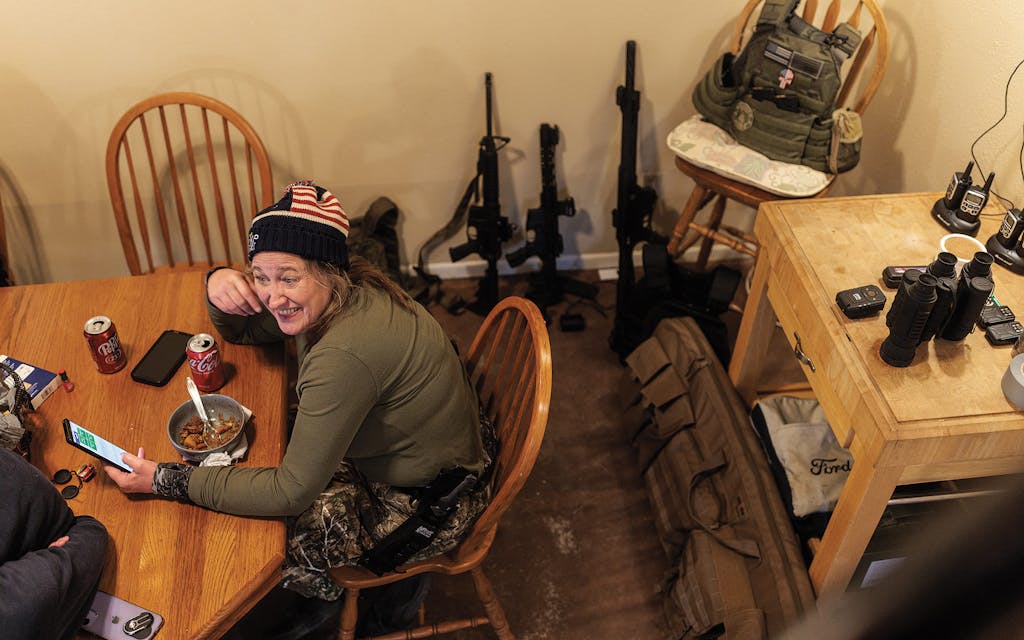
Immediately after key local officials welcomed him, Hall organized a patrol on Kinney County’s public roads. His militia slept on cots for a few days in the county civic center free of charge. In an October interview with a right-wing news site, Kinney County sheriff Brad Coe praised members of a militia he’d “recently met” as well trained. “They seemed to be all Christian-based,” he said. “Over the years, people have confused the militia with vigilantes, so it’s kind of gotten a bad name, a bad rap, but we wouldn’t be here today if it wasn’t for the first militia in the country.”
Smith agreed. “To me, it’s a constitutional right they are exercising,” he told the same news site. “And they are here to protect our local residents and ranch owners.”
With a population of just 3,100, Kinney County became a hot spot for Operation Lone Star enforcement. Since May of 2021, the Kinney County Sheriff’s Department has arrested at least 50 migrants a week, and often upwards of 120—more than any other county in Texas. By March, according to the governor’s office, 11,800 migrants—more than 3,000 of whom were caught in Kinney County—had been charged with criminal offenses across the state. (Recent reporting revealed that the state’s numbers include crimes unrelated to border enforcement.) According to the county sheriff’s department, no PFA-assisted apprehensions have occurred on private property, where migrants could be arrested on state trespassing charges rather than being taken to detention centers or sent back to Mexico.
As of March, a few hundred migrants languished in state prisons awaiting court dates in Kinney County; because of a dearth of judges, those cases might not be heard for a year. The local court was so overwhelmed late last year that the state assigned three retired judges, two Republicans and a Democrat, to help with the workload. Shahan, without explanation, replaced the visiting judges with five jurists he handpicked. Defense attorneys have since filed motions and appeals alleging the county is violating state law by holding migrants in jail for months without charging them with crimes and without bringing them to trial.
Kinney County’s embrace of militia groups to patrol the border has concerned both civil liberties advocates and those who document American extremism. “The militia doesn’t have training in protecting rights,” said Kate Huddleston, a staff attorney for the American Civil Liberties Union of Texas. “They are not part of the state or county. The fact that these militia members are heavily armed, and that the PFA has made xenophobic statements, shows poor judgment by law enforcement agencies partnering with it.” (Hall denies that his militia is anti-immigrant.)
Recently, Smith indicated to Texas Monthly that while he is supportive of the PFA in theory, he doesn’t like the group’s attempts to solicit donations by claiming to have a partnership with Kinney County. “Mr. Hall has harmed Kinney County more than he has helped,” Smith wrote in an email. “[Hall’s] assertions that he has a close working relationship with Sheriff Coe or anyone in Kinney County is simply untrue.”
“You can never have too many guns, never have too many knives, never have too much ammo.”
Asked how that statement squares with at least seven rotations in Kinney County conducted by the PFA, including one in early March, Smith said that local ranchers have had their land trespassed upon and property damaged by migrants. “To translate this for those city folks in Austin, it is much like taking your car to the body shop each week and getting a door or fender replaced. One repair is not a huge burden, but when it becomes a weekly or monthly occurrence, the costs add up quick,” Smith wrote, before relaying the story of a rancher who he said had quit the business because of the high cost of property repairs.
Many ranchers in Kinney County have had fences broken and have paid to fix them, but Smith did not provide the name of the landowner whose story he cited. “In a crisis like we are currently experiencing,” he said, “a volunteer organization like PFA could have aided this rancher and prevented him from going out of business.”
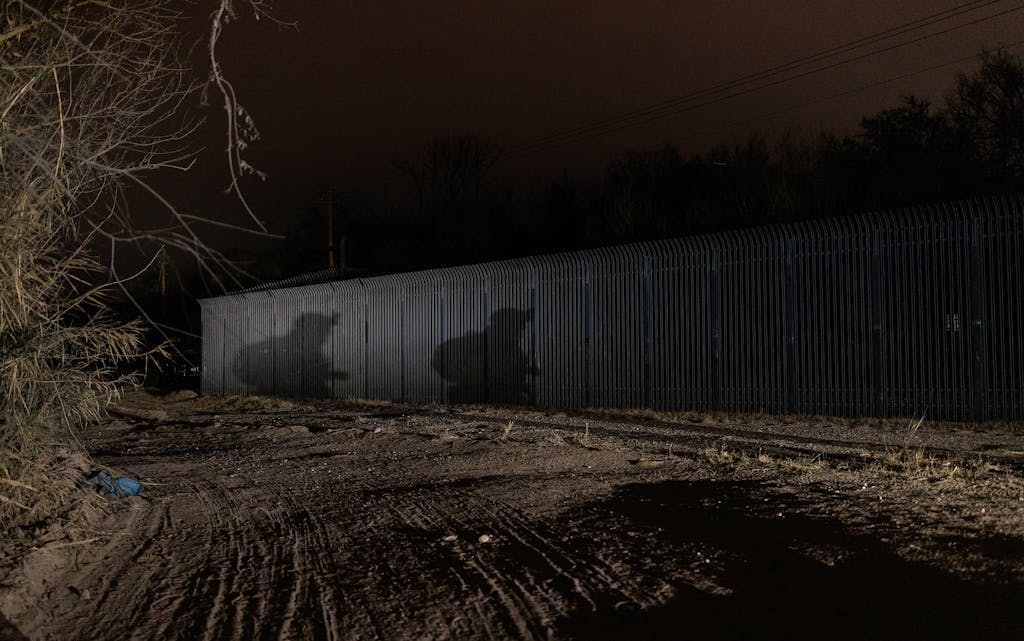
Experts estimate there are as many as three hundred active militia groups in the U.S., a handful of which, like the PFA, patrol the border. Freddy Cruz, a research analyst at the Southern Poverty Law Center who tracks militias and was aware of the PFA, said that when migrants encounter vigilantes, they may not understand that they’re not members of Border Patrol. He added that members of such militias often lack proper training in weapons safety as well as knowledge of the law, and that they hold extremist views on immigration.
When I traveled with the militia on a different January patrol, some in the group were embarking on their first operation. “We want to give the new people the lay of the land,” Hall told me. When Hall and other militia members drove from Kinney County to Eagle Pass, I sat next to Taylor Cramer, a cryptocurrency investor and former trucker, and his array of weapons and video equipment.
Hall periodically launched into long monologues about the PFA, alternatively pensive and vulgar, delivered with the cadence of a revivalist preacher. “We are a humanitarian group,” he said. “We understand when we come across illegals, they could’ve been in a life-threatening situation. We pray with them. We are not aggressive to anybody.”
The militia’s first stop that day was a residential street in Del Rio parallel to the Rio Grande. Some in the group had never seen the river before. Along the street, the Texas National Guard was erecting a miles-long, six-foot-tall chain-link fence topped with razor wire, part of a border barrier ordered by Abbott in June at a cost of $250 million. “I’d like that fence-patching contract,” said Caldwell, pointing to a repaired hole in the barrier, presumably damaged by a migrant with $5 wire cutters. “It’s like having a pothole-filling business in Africa,” said Hall, who promised he would vote against Abbott in the primary because the governor was not sufficiently cracking down on immigration.
The PFA drove south from Del Rio to Shelby Park, where members conducted reconnaissance ahead of a nighttime operation. As he watched Border Patrol agents apprehend asylum seekers, Anderson questioned their policies of taking them to detention rather than immediately deporting them. “We have all these patriots here,” he barked, to no response. “We’re willing to push back and not let them in.”
After sundown, the militia patrolled a desolate road in Kinney County. The night was cold and clear, and several members attached flashlights to the muzzles of their long guns. Though they were about ten miles from the river, Hall explained that undocumented immigrants traversed the area often.
Shawn Tredway, Hall’s second-in-command, grabbed a few in the group to check out an area around a short train bridge. Anderson, Caldwell, and Hall hung back at the trucks. The patrol tried to move silently but frequently cracked branches, and some anxiously pointed their lights at every shadow and crevice. It was hard to imagine the group sneaking up on anyone. After inspecting the area, the militia found only a handful of empty water bottles and some clothes.
The jumpiness of a few of the militia members seemed contagious. Some allies were careless enough with their firearms that they were given a gun-safety training the next day. Rhonda “Mama Bear” Kates, a middle-aged PFA member from Big Spring who works as a customer service representative for an oil pump manufacturer, later told me, “You can never have too many guns, never have too many knives, never have too much ammo.”
After returning to the trucks, members of the patrol grew excited when they found two fresh urine stains on the sandy roadside. Could it be a sign of migrants nearby? No. Hall and Anderson had urinated there. Hall laughed at the patrol’s eagerness.
The militia returned to its base shortly before 1 a.m. Some went to bed. Others stayed up late, drinking beer and smoking cigarettes as Hall told stories of long-ago dating mishaps. Though they’d failed to catch any migrants, a few in the militia nonetheless considered the night a success. “Out here,” Cramer told me, “it feels like you’re doing something instead of sitting on the couch and getting mad.”
James Dobbins is a journalist based in San Antonio.
This article originally appeared in the May 2022 issue of Texas Monthly with the headline “An Unregulated Militia.” Subscribe today.
- More About:
- Politics & Policy
- Greg Abbott

